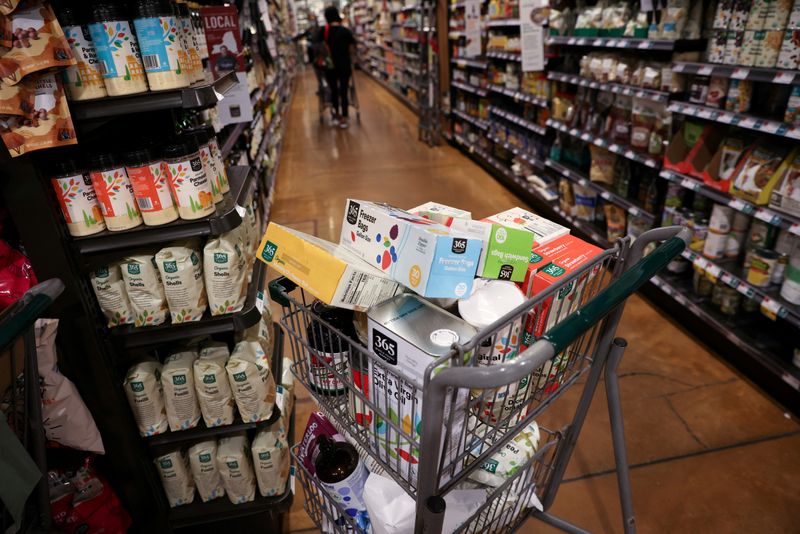A look at the day ahead in U.S. and global markets from Mike Dolan
With world headlines focussed on first anniversary of Russia's invasion of Ukraine, the inflationary consequences that pounded world markets last year still smoulder.
Curiously, the initial energy shock from the Ukraine war is already less of a problem than the change in pricing behaviour that it seeded - especially in services still distorted by the pandemic, in corporate margin building and rising wage settlements.
Due to powerful base effects comparing today's price with the surge after the invasion, crude oil prices are now falling at an annual rate of 16%. And thanks to Europe's mild winter, brimming storage and gas substitution, yearend natural gas prices are back to where they were 11 months ago - down more than 31% so far in 2023.
But it's the pickup and stickiness in underlying "core" prices, excluding energy and food, that is irking the central banks and the Federal Reserve most of all.
And if the world economy is gathering some steam again in 2023, as recent numbers suggest, interest rate policy may have to be a lot harsher than everyone has assumed.
Alongside another tight U.S. weekly jobs report, markets got another glimpse of those price pressures on Thursday.
The Commerce Department showed inflation increased much faster than initially estimated in the fourth quarter of last year, with the core personal consumption expenditures (PCE) measure that the Fed favours accelerating at a 4.3% pace compared with prior estimate of 3.9%.
The revisions to prices were led by used and new motor vehicles and fees for nonprofit hospital services.
Friday gets a more updated monthly view of core PCE from January and it's not yet clear if quarterly revisions affect the standing consensus forecast for an easing of the rate to 4.3% from 4.4% in December - still more than twice the Fed's target.
Markets are now braced for three more quarter-point rate hikes from the Fed to at least 5.25%-5.50%, with no cut fully priced from there by yearend. At 4.71% on Friday, two-year Treasury yields are close to cycle highs.
Although cheered on Thursday by chip designer Nvidia's blowout earnings and upbeat outlook, S&P500 stock futures are back in the red - barely clinging to the pivotal 4,000 point level.
And increasingly buoyed by the still intense geopolitical fallout from a year of the war in Ukraine, the dollar pushed higher yet again.
Whether China now backs Moscow militarily as well as rhetorically is seen as one of the biggest global questions surrounding the war 12 months on and would mark critical juncture in Western relations with Beijing too - and in trade globalisation more generally.
China's offshore yuan fell to its lowest level of the year against the dollar on Friday.
The dollar also rose against Japan's yen on Friday, with the Nikkei's 1% gain bucking the dour weekend mood elsewhere, after comments by the incoming Bank of Japan chief.
Even though data showed Japan's core consumer inflation hitting a fresh 41-year high in January, Kazuo Ueda insisted the BOJ must maintain ultra-low interest rates to support the fragile economy, warning of the dangers of responding to cost-driven inflation with monetary tightening.
Key developments that may provide direction to U.S. markets later on Friday:
* U.S. January personal income and spending, PCE inflation indices, January new home sales; Kansas City Fed February service sector survey
* Cleveland Federal Reserve President Loretta Mester, Fed Board Governor Philip Jefferson, Boston Fed chief Susan Collins speak. Bank of England policymaker Silvana Tenreyro speaks
* Japan's Prime Minister Fumio Kishida chairs G7 leaders meeting. Finance ministers of G20 countries and their central bank chiefs to meet near Bengaluru
* U.S. Treasury sells -year notes
* U.S. corp earnings: Evergy
Graphic: US Inflation https://www.reuters.com/graphics/USA-STOCKS/jnpwyxqwxpw/inflation.png
Graphic: Jobless claims https://www.reuters.com/graphics/USA-STOCKS/mopakqkrrpa/claims.png

Graphic: Japan's core inflation hits fresh 41-year high https://www.reuters.com/graphics/JAPAN-ECONOMY/INFLATION/dwvkdzaqapm/chart.png
Graphic: Moscow suspends nuclear arms control treaty https://www.reuters.com/graphics/UKRAINE-CRISIS/PUTIN-NUCLEAR/byprlqodype/chart.png
(By Mike Dolan, editing by Tomasz Janowski mike.dolan@thomsonreuters.com. Twitter: @reutersMikeD)